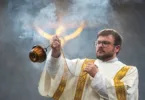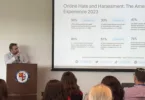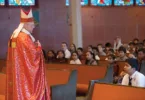by Joe Bollig
joe.bollig@theleaven.org
LAWRENCE — When Karen Lombardi’s mother predicted that the fallen-away Catholic was destined to become a nun, Lomabardi thought she was crazy.
All Lombardi had done was enroll in a local Bible college to earn a Bible study certificate. And although she had been raised Catholic, “I thought it was very funny because I wasn’t Catholic and wasn’t going to a Catholic school [at the time],” said Lombardi.
Lombardi had left the church her sophomore year at Juniata College in Pennsylvania, where she was “challenged a lot by questions I didn’t know the answer to,” she said.
The poor catechesis of her upbringing left her unable to answer these questions and susceptible to the attractions of other Christian churches. Lombardi left the Catholic faith and began a sojourn through a succession of Protestant and Reformed denominations.
Now, about a decade later, Lombardi is once again a practicing Catholic and works as student life coordinator at the St. Lawrence Catholic Campus Center in Lawrence.
And although she didn’t become a nun, as her mother predicted, Lombardi has entered a vocation that shares many commonalities with the vowed life of a woman religious.
During a Mass on Feb. 2 at the St. Lawrence Center, Lombardi was received by Archbishop Joseph F. Naumann into the life of a consecrated virgin.
A historic first
“She’s not the only consecrated virgin living in the archdiocese, but she’s the first woman in recent history — possibly ever — consecrated in the archdiocese,” said Father John Riley, archdiocesan chancellor, who assisted Lombardi on her journey.
“We have no other record of a virgin being consecrated in the archdiocese,” he continued. “Certainly, she is the first Archbishop Naumann has consecrated.”
The consecration of a virgin is one of the oldest sacramentals in the history of the church. The most notable consecrated virgin is the Blessed Mother herself, and there are accounts of several consecrated virgins in early church history.
Despite the sacramental’s antiquity, canon law doesn’t have much to say about consecrated virgins, said Father Riley. A great deal of discretion is left to the consecrating bishop.
Much more — six paragraphs — is said about consecrated virgins in the Catechism of the Catholic Church. A consecrated virgin is a woman who has “decided with the Church’s approval to live in [a state] of virginity ‘for the sake of the kingdom of heaven’” (922).
Further, consecrated virgins “are betrothed mystically to Christ, the Son of God, and are dedicated to the service of the Church . . . [and] constituted a transcendent sign of the Church’s love for Christ, and an eschatological image of this heavenly Bride of Christ and of the life to come” (923).
That is why the consecrated virgin, considered a spouse of Christ, wears a wedding dress and veil for the consecration rite. It is considered a lifelong, permanent vocation.
Unlike women religious, consecrated virgins don’t live in community or according to a rule, wear a habit, or have a title like “Sister.” Nor are they restricted to one or more kinds of ministries.
Consecrated virgins appear like any unmarried woman living and working in the world. They are, however, required to pray the Liturgy of the Hours, receive the sacraments and live a life of prayer. Usually, consecrated virgins offer some service to the church according to whatever talent or spiritual gift they possess.
Back to the future
Lombardi’s journey back to the church, and to her vocation as a consecrated virgin, began after she came to Lawrence in 2006 to study for a doctorate at the University of Kansas.
She found an evangelical Protestant church there that she liked and she felt generally fulfilled — except that her spiritual life seemed inadequate.
“In January of 2007, I decided I needed help with my spiritual life, so I Googled spiritual direction in Lawrence, Kansas, and I found the Apostles of the Interior Life,” said Lombardi.
Eventually, she was accepted for spiritual direction by Sister Elena Morcelli, AVI, and they began to meet. Lombardi didn’t think her Protestant faith would be challenged.
“I thought I’ve been out of the church for 10 years, [the Sisters] aren’t going to tell me something about Catholicism that I haven’t already thought about and dismissed,” she said. “I felt like I know Catholicism, I know my Protestant faith, I’m good where I am, I just need help with my prayer.”
Those 20 to 30 minutes of daily prayer with the Scriptures required by her spiritual director, however, began to move Lombardi. And it wasn’t long before Sister Elena challenged her about belief in the Eucharist.
“The Lord really started to speak to me in different ways,” said Lombardi. “If the Catholic Church is right about the Eucharist, then I’ve chosen fellowship with my friends over fellowship with God.”
Her relationship with God grew stronger, especially with participation in eucharistic adoration, with which she previously had been unfamiliar. She also studied what John Calvin, who left the Catholic Church in 1530 to found Calvinistic theology, wrote about the Eucharist.
One objection after another fell, like dominoes. At the end of February 2008, she decided to return to the Catholic Church.
“I was already fully initiated into the Catholic Church, so I didn’t have to go through RCIA,” said Lombardi.
She went to the sacrament of reconciliation during a Kansas Catholic College Student Convention and received the Eucharist for the first time as a returning Catholic at a Mass there celebrated by Archbishop Joseph F. Naumann.
In her freshman year of college, before she left the church, she had briefly flirted with the idea of becoming a nun.
“Once I came back to the church, it hit me that this was a possibility again,” said Lombardi. “That scared me. I brought it to my spiritual director. I said I just came back to the Catholic Church and I can’t deal with it right now.”
Lombardi began to discern vocations to marriage and to religious life, but neither seemed to fit her. Then, she learned about consecrated virgins, and found information on the web site of the United States Association of Consecrated Virgins.
“I said, ‘OK, Lord, my answer is ‘yes’ to whatever you’re asking me, whatever it is,’” she said.
She sent a letter to Archbishop Naumann on Feb. 2, 2011. She underwent spiritual formation assisted by the archbishop and Father Riley, and under the direction of the Apostles of the Interior Life.
Her ultimate choice of vocation came as no surprise to Father Steve Beseau, director and chaplain of the St. Lawrence Center.
“It’s a supernatural calling, but it’s also a natural fit for her,” he said. “Her vocation is a real gift for her, the St. Lawrence Center and the entire church. Karen has always been committed to seeking God’s will in her life, and she’s always wanted to find her place in the church.”
Family and other friends supported her decision as well.
“Overall, [I received] a lot more positive reactions than I would have expected,” she said. “I think I expected having to defend or explain it more. It was a long process, and that helped. . . . It made sense to them — [it reflected] the direction my life had been going for a while.”
For more information
Visit the website of the U.S. Association of Consecrated Virgins at: consecrated virgins.org.






